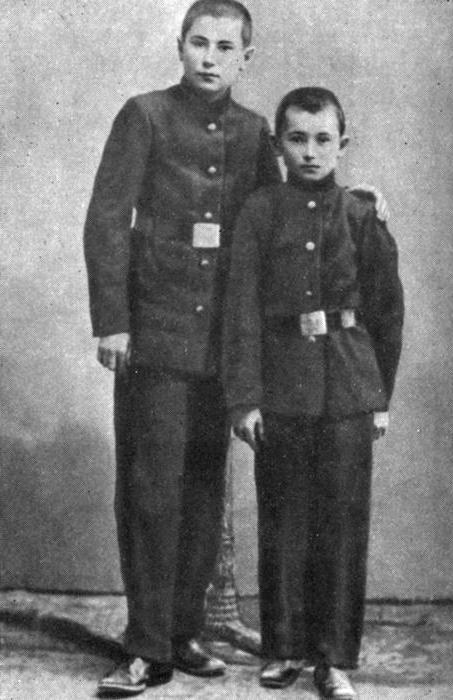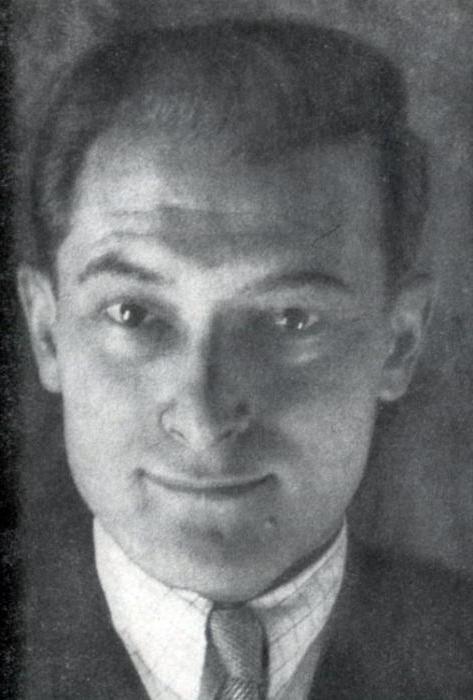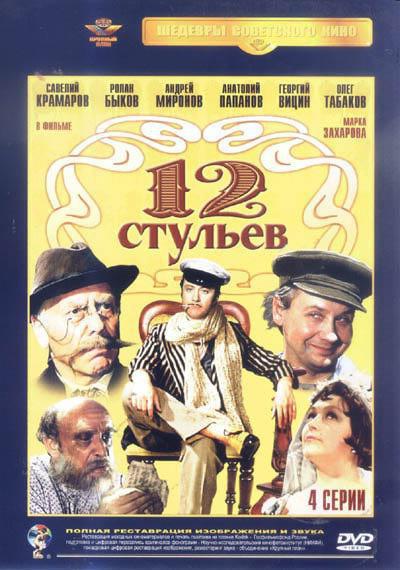There are few people in Russia who did not read, did not watch, or at least did not hear about such iconic works of our literature as The Twelve Chairs and The Golden Calf, about people with the names Ilf and Petrov. They are usually called always together, and this is quite natural: they worked shoulder to shoulder for many years. Nevertheless, by themselves, they remained completely integral units. For example, the writer Evgeny Petrov - what is he like?
Childhood
Evgeny Petrovich Kataev (this is what the real name of the writer sounds like) was born on December 13, 1902. His native city was Odessa. In addition to Evgeny, a six-year-old child was already growing up in the family of teacher Pyotr Vasilyevich and pianist Evgenia Ivanovna - the eldest son Valentin (the same Valentin Kataev, who will become a famous writer in the future - little is known about the fact that he and Petrov are siblings). Looking ahead, it is necessary to clarify the meaning of the pseudonym for the youngest of the brothers: by the time Eugene began to make his way in literary circles, he had already begun to conquer this Olympus, and judging that there were too many two Kataevs in literature, the younger brother “lost” to the older real name, taking fictional Petrov - middle name (after all, they were Petrovichi).

Only three months after the birth of Eugene, the mother of the boys died of the disease, and the father was left with two children completely alone. However, right there the sister of the deceased wife Elizabeth rushed to the rescue - having abandoned all her affairs, abandoning her personal life, she devoted all herself to caring for her nephews. The father of future writers never married again. Both he and his aunt sought to raise the boys as educated people, the house had a rich library, and Pyotr Vasilievich never skimped on the purchase of new books. Perhaps this is precisely why the eldest from a young age decided that he would write - unlike the younger, who did not want to become a writer for anything, but was forced to drag his tail around all the editorial offices after his brother — Valentin alone was shy and afraid to go. From the age of thirteen, Valentin’s stories began to be published, while Eugene’s compositions at school were not always successful and barely possible. Of course, he also loved to read - but by no means a classic, but detective stories and adventures. He adored Sherlock Holmes and himself dreamed of becoming a great detective.
Youth
After the revolution in Odessa, as, indeed, in other cities, hard times came. There were waves of arrests, as the former tsarist officer was detained by Valentin Kataev. Together with him, Eugene got into jail - because the next of kin. The arrest did not last long, they soon released both brothers, but, deciding not to spoil the reputation of Eugene, they both remained silent all their lives that not only the eldest, but also the youngest of them had been in prison.
Since Yevgeny Petrov dreamed of becoming a detective, he went to work on the wanted list and, according to documents, was one of the best operatives. Evgeny Petrov’s work in the criminal investigation department began in 1921, and in the same year the father of the brothers died - unfortunately, both of them were not in Odessa then, they did not have time to say goodbye to their father. Soon after, Valentine left his hometown - first he went to Kharkov, then to Moscow, where he began to wait for his younger brother. He joined the elder two years later. So in the biography of Evgeny Petrov appeared Moscow.
The beginning of the way
Arriving in the capital, Eugene began to live with his brother, but, not wanting to be “a burden”, he hastily began to look for work. With recommendations from the Odessa criminal investigation department, he went to the Moscow police - but there were no places there, and all that the young man could offer was the position of overseer in Butyrka prison. Eugene was going to accept this invitation, but Valentine, learning about it, prevented such a decision. He wanted his brother to become a journalist. At the request of Valentin, Eugene wrote a small feuilleton, which was immediately printed in one of the newspapers and given to the young author a fee - much more than a month’s salary in prison. After that, Eugene stopped resisting his brother.

His journalistic career began with Red Pepper, where he worked as executive secretary. At the same time, he did not shun part-time jobs - he ran around to various editorial offices, bringing ever new feuilletons: fortunately, his life experience was rich, after working in the criminal investigation department. It was during these years that he took his pseudonym. Whatever Petrov did! In addition to feuilletons, he wrote satirical notes, invented caricatures, composed poems - in general, did not refuse any genres, which allowed him to start making good money and move from his brother to a separate room.
Acquaintance with Ilya Ilf
Ilya Ilf and Evgeny Petrov both grew up in Odessa, but it so happened that their paths crossed only in Moscow. At the same time, Ilf, five years older, arrived in the capital at the same time that Petrov was a whim of fate. Their acquaintance happened at the editorial office of the Gudok newspaper in 1926 - Petrov then came to work there, and Ilf already worked in it. The writers approached a year later, when they were sent on a joint business trip to the Caucasus and the Crimea. After spending some time together, they discovered a lot in common and, perhaps, it was then that they decided to compose together.
And soon the occasion turned up, and it was not someone who threw him, but his brother Evgeny Valentin. He invited his friends to work for him with the so-called
literary blacks: he gave the theme of the work with the condition that when it is ready, he will slightly correct it, and on the cover there should be three names: Kataev, Petrov, Ilf. The name Valentine already had weight in literary circles and was supposed to help the future book find its reader faster. Friends agreed. And the theme suggested by Valentine sounded like this: “Money that needs to be found is hidden in the chairs.”
Golden Calf and Twelve Chairs
Ilya Ilf and Yevgeny Petrov began working on the manuscript “On Chairs” in the early autumn of 1927. Valentine then left the capital, and after returning a month later he saw the first part of the novel already ready. After reading it, Kataev without hesitation refused the “laurel wreaths” and his last name on the cover of a future book, giving all the glory to his brother and his friend - he asked only to devote this masterpiece to him and buy a gift from the first fee. By January, the work was completed, and its publication almost immediately began - until July, the novel was published in the magazine Thirty Days.

And friends have already conceived a sequel - notes in the notebooks of both testify to this. For a year they nurtured the idea, edited, finalized, and in 1929 began to implement it. Two years later, the continuation of the story about Ostap Bender called "The Golden Calf" was completed. It was also started to be published by the magazine Thirty Days, but for political reasons the publication was interrupted, and a separate book could not be published until three years later.
The Twelve Chairs immediately won the love of readers, and not only of them - they began to translate the novel into other languages. However, it was not without a “fly in the ointment” - firstly, the work of Ilf and Petrov greatly “encroached” on censorship, and secondly, reviews appeared that called their debut offspring a “toy” that did not correspond to reality. Of course, this could not but upset the writers, but they could cope with their feelings.
The Golden Calf had a harder time. The character of Ostap Bender did not like the top leadership, which is why they stopped printing the novel and did not agree to release it as a separate publication. Reviewers also continued to “egg” the creative union of two friends, believing that soon their work will sink into oblivion. Fortunately, this did not happen, and after Maxim Gorky stood up for Ilf and Petrov, the Golden Calf finally saw the light not only abroad.
Personal life
The wife of Yevgeny Petrov was called Valentina, she was eight years younger than him. They got married when the girl was barely nineteen. The marriage was happy, two sons were born in it - Peter (in honor of his father) and Ilya (in honor of a friend). According to the recollections of the writer's granddaughter, her grandmother, until her death (in 1991), continued to love her husband and never took the ring he had donated from her finger.
The eldest son of Eugene and Valentina became a cameraman, shot many famous Soviet films. The younger, Ilya, worked as a composer, wrote music for several films and series.
Ilf and Petrov
After working on the Twelve Chairs and the Golden Calf, Ilya Ilf and Yevgeny Petrov did not scatter. Their tandem lasted for many years - until the very death of Ilf. The result of their labors was multiple feuilleton and tales, novels and movie scripts, essays, short stories, vaudeville and even a “double biography”. They traveled together a lot, bringing unique impressions from these trips, which were subsequently processed and were published in the form of a literary work.
Having become strong friends, they even wanted to die together - then, in their own words, the other "would not have to suffer." It didn’t work out - Ilf left first, five years earlier than his friend. He suffered from tuberculosis, which in 1937 worsened. Soon he died, as did the tandem of Ilf and Petrov.
"One-story America"
A year before the death of Ilya Ilf, friends visited America - they were sent there as correspondents for the newspaper Pravda. For more than three months, they have visited more than twenty different states, met many interesting people, including the writer Ernest Hemingway, and brought a huge baggage of impressions. All of them are reflected in the book of essays "One-story America." This work was the first - and the only one that friends wrote separately (due to Ilf's illness): they made a plan in advance, distributed the parts among themselves, and set about creating. Despite this type of work, even those who knew friends closely could not subsequently determine what was written by Ilya and what was written by Eugene. By the way, photographs taken by Ilf were also attached to the essays - he was very interested in this type of art.
Evgeny Petrov after Ilya Ilf
After the death of a friend, the work of Yevgeny Petrov abruptly failed. For some time he did not write, because it was hard to start all over again - and already alone. But gradually he nevertheless returned to work. The writer Evgeny Petrov became the responsible editor of the magazine "Spark", wrote several plays and essays. But he was not used to work alone, and therefore began to cooperate with George Moonblit. Together they created several movie scripts.
In addition, Evgeny Petrov did not forget about the untimely departed friend. He organized the publication of his Notebooks, was going to write a novel about Ilf - but did not have time. Their mutual acquaintances recalled much later that the features of Ilf were preserved in Petrov until his death.
With the outbreak of war, sending his family to evacuate, Yevgeny Petrov began working as a war correspondent with his older brother. He wrote for the press both in our country and in foreign ones, often flew to the front line, survived even a shell shock.
Death
The exact circumstances of the tragic death of E. Petrov are still unknown. In 1942, the writer Evgeny Petrov was sent on another business trip - to Sevastopol. In addition to the Crimean city, he also visited Novorossiysk and Krasnodar, from the latter flew to Moscow. According to some eyewitnesses who were aboard the same plane, Eugene, breaking the instructions, went into the cockpit to the pilots on some issue. Perhaps he asked to increase the speed - he was in a hurry to the capital. The pilot was distracted by the conversation and did not have time to notice the hill that suddenly appeared in front of him. Despite the fact that the height from which the plane fell was small, about twenty meters, Petrov died, the only one of them all.
There is another version of the tragedy, which, incidentally, was supported by the writer’s brother, Valentin - supposedly the plane was pursued by German Messerschmitts, and it crashed, leaving the chase. The writer was buried in the Rostov region.
The writer Evgeny Petrov lived a short, but very bright and eventful life. After him, a rich legacy, great creativity. He did not have much time, but nevertheless did enough too. So, his life was lived not in vain.